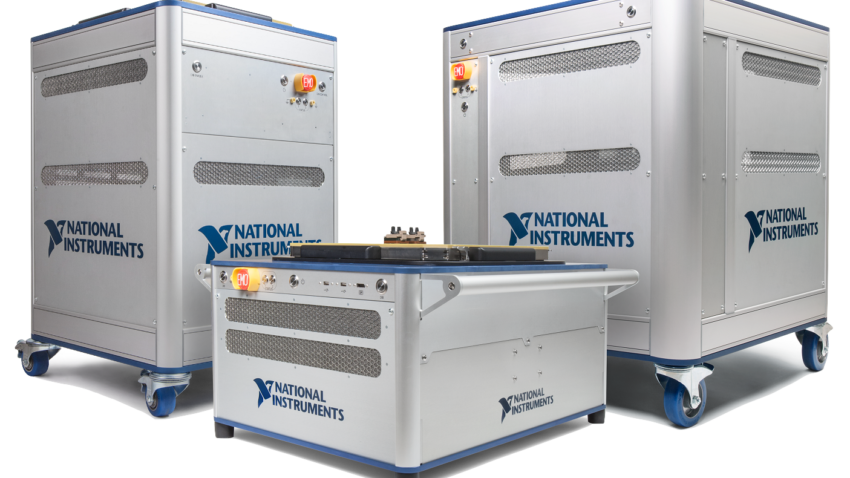
Introduction
At the 2017 European CLA Summit I took part in a panel discussion with the topic of “Issues Related to Maintaining and Growing a LabVIEW Related Business”. This panel discussion was chaired by Malcolm Myers and was quite well received by the CLA audience. It covered the experiences of the panel in starting a LabVIEW based business.
The panel discussion lasted for 1 hour, but could really have been much longer. There were many topics that were not discussed and some that could have been discussed for much longer. This is by no means a criticism, if anything it shows just how much there is to say and learn about something that on the face of it seems so simple.
In this blog post I will discuss my views on the Who, What, Where, When, Why and How of starting a LabVIEW based business from scratch, and relate it directly to my own experience of starting iNU Solutions in 2013.
As ever this is just my ramblings on the topic and not intended to be a trigger to go off and make life changing decisions. That said, if my experience gives you the last little push you need, mine’s a Jack Daniels and Coke! 🙂
Who
Well the simple answer to this is anyone.
The real answer is of course far different. Why? Because everyone is different.
For example
Person 1:
This person is more than happy to work their 9 to 5 job, go home, forget about work and relax with the family. Their weekends are free to do whatever they want, they are members of lots of clubs, have lots of hobbies and they go on long vacations — maybe even without taking their phones/tablets/laptops with them — they may even be lucky enough to get paid leave while on vacation.
This kind of person probably should not start their own company.
Person 2
This person always wants that little bit more, they always have that little raging voice in the back of your head saying “I could do that better” or “that guy has no idea what he’s doing”. They do not feel that they belong somewhere in an organisational structure hung on a wall in the HR office. Their job is more than that, their chosen profession is part of their life, it is part of who they are and ripples through everything else they do in their life.
This kind of person probably should think seriously about starting their own company.
When I graduated from university I started almost immediately on a graduate recruitment scheme and really enjoyed myself. I got to travel a lot, met lots of great people and learnt how to apply my mainly theoretical knowledge into real world solutions. After the scheme ended I started a full time job and at first continued to enjoy my work. I soon however started to become very unmotivated by the confines of job descriptions, departments, budgets, etc. that exist in large organisations. I changed positions 3 times in 5 years but just couldn’t settle and towards the end of 2012 I left. During the last few months of work I had decided that I wanted to start working for myself doing what I really enjoyed doing, which just happened to be working with LabVIEW.
My wife had a similar story, although in a slightly different profession. She had become tired of “working for the man” and never really getting anywhere. She began to look into working for herself, she started a website where she wrote blogs and articles, spoke to magazines about writing for them and almost started her own company. However she then had the opportunity to change career paths completely, she started a new job that she felt very happy in and now just writes her blog post as a hobby.
We will never know if she would have enjoyed working for herself, or if she would have been successful in her venture.
My point is that thinking “I’ve had enough of this, I’m off to work for myself” isn’t always the only solution.
What
Obviously the main focus of your new company will be LabVIEW, but exactly what are you offering? Consultancy? Training? On-site work? Remote work?
When offering a consultancy service, do you have a special area of expertise or will you just be a “LabVIEW guy”? This is very important if there are already people in your area offering that same service, what makes you different to them?
If you are offering on-site work then will you be a jack of all trades or will you target a specific industry? Both have their advantages but you need to be clear on what you are offering.
For training will you become certified or will you give your own custom course? What are the benefits to your course over the official NI courses?
Where
This may seem like a strange thing to consider but when I say “where” I do not only mean in which country or city, but also where will you do the work?
First, lets start with country. Logically the country you live in is the ideal place to start, but remember that this is about starting a LabVIEW based business. LabVIEW is software that can be sent anywhere in the world, so do you create an appearance of a global company or do you just keep it local? An example of this could be to have your website in English for a global outlook or (in my case) Dutch for a more local audience. Even simple things like a .co.uk or a .nl website address can give clues as to your outreach.
Right, so you have decided to keep it within you home country. Now, are you willing to travel? How far? Are you available for on-site projects? What is your maximum drive time, are you willing to drive or will you only travel by public transport? Where I live in the Netherlands I can be in Antwerp, Belgium faster than I can be in Amsterdam, so be careful not to limit your search to “Netherlands” when looking for projects.
If however you live in a country the size of the USA then this becomes a little more difficult. Your language will be English (or at least the American version of it!), your currency will be $$, your website will more than likely be a .com address, so how do you say “I am only available for work in Ohio and Indiana” without appearing too inflexible?
All of these are important things to consider when deciding on how to market yourself to the world.
Now, where will you actually do the work? If you have a large house with a spare room you can turn into an office then maybe this is good enough. You would need to consider how you will go about meeting customers and how you separate your work from your home life. If your work is just upstairs then there is always the inclination to just “go finish something off” after dinner and then before you know it it’s 11 o’clock, the kids are in bed and the wife has eaten all the Ben & Jerry’s from the freezer!*
But seriously, there are many factors to consider when making the choice to work from home. On the face of it there are only advantages, short commute, comfortable, you are home for deliveries, you can stay home with the kids if they are sick, etc.
In reality these advantages slowly become distractions and the temptation for procrastination grows stronger every day. For example I don’t know many offices that have a 55” TV and Netflix to distract you while you are having your lunch.*
So, whats the alternative? Finding your own office to work from is really the only alternative (unless you happen to be a fan of the business model adopted by The Lincoln Lawyer). The next decision is how much space do you need? If it is just you then around 20 square meters would probably be ok, or if you plan on hiring straight away then you will probably need more. In most countries there are laws on the minimum area per employee required. Keep in mind your future plans, if you want to expand in the next 2 or 3 years then consider finding an office bigger than your current needs, or a space in a communal building where you can easily rent the next office.
The obvious down side to having an office is the cost, both longterm (rent, mortgage) and the short term (desks, chairs, hole punch, etc.). Also consider the location of the office, this is something you are totally in control of. There is no point in having an office the other side of the busiest junction on the ring road. For the same reasons as mentioned above, there is no point in having an office right across the street from your house.
Although in theory you only need a laptop to do LabVIEW work, in reality there are a lot of other things that are also required. Remember that LabVIEW can also be used to control equipment, what if you need to build that, or have it with you for testing? Would you also need a workshop type area?
I find that I often need a certain amount of travel time to switch from work mode to family mode, this time varies depending on the type of day I’ve had but that separation I feel is very important. I would guess that most people on a psychological level require the act of going to work and coming home from work.
The final decision would be to rent or buy. This is something that is so country specific (and tax authority specific) that it is not worth making any comment here.
* This may or may not be based on real life events
When
This is kind of the million dollar question for anyone wanting to start a business, when exactly do you take the plunge? Depending on how risk averse you are, the answer will be different. Maybe you are out of work anyway and having trouble finding something that inspires you, in this case you have nothing to lose really. Even if you then find a job you can still do work on the side.
If you cannot financially make the commitment to stop working full time and start a company then maybe you could do both for a time. You could then slowly build your business while still having a guaranteed income. When you feel confident, you can quit the full time job (or if you have a flexible employer you could work part time) and concentrate on your own business. If for whatever reason your business doesn’t take off then you still have your job and all you have lost is the time you invested.
I see quite often tweets from Sir Richard Branson saying “Screw it, let’s do it”, which is quite a good attitude to have. It does however help if you have a few billion in the bank to fall back on.
When I started iNU I was lucky that my wife had quite a well paid job and thanks to some crazy Dutch employment laws I received quite a payoff from my previous employer. This gave me the financial security to give it a go and see what happened. We decided that if there was no real sign of success after 12 months then I would go back to a real job. Having this cutoff point was important for me, as it gave the “experiment” a deadline so things didn’t just wander on and on. The definition of “success” however is open to interpretation.
In reality every situation is different and there is no real answer. A few years ago when I was discussing with a friend about when to start a family they said “if you continue to wait for the perfect time, then you will never actually do it”, which it totally true and can easily be applied to starting your business.
Why
This may seem like a weird question to ask yourself, but I feel that it is an important one. Why exactly do you want to start the company? What is your motivation to make the leap to self-employment?
Have you seen a gap in the market for a specific service? Can you build a product that fulfils a real need? Is there no-one else that can do what you do in your area?
Maybe you really admire the culture at a friends company and would like to re-create that in your own environment, my advice would be just to join your friends company. Trying to re-create a work culture is like trying to re-create a great night out you had a few weeks ago with your mates, all the ingredients may be right but it just won’t be the same. A company, your company, needs to have its own identity and its own way of doing things.
My motivation was almost entirely the prevention of boredom. I am very easily distracted and any kind of repetitive task quickly erodes my patience. I have a natural craving for learning, solving problems, exploring new technologies, anything that doesn’t involve something I’ve done before. Since starting iNU I have worked with a wide variety of companies of all sizes and some very different industries, from medical research to fashion. No two projects have ever been the same and I have never been bored at work. The thought of doing the same job at the same company for the next 25 years makes my brain shed a little cerebrospinal tear.
If your only motivation is money then your venture is almost certain to end in failure.
How
So after all the discussion and deliberating you have decided that starting a company is exactly what you want to do, all that remains is to do it. But how are you going to do it?
What I mean by this may not really be clear on first thought, but how exactly are you going to get your first project? How are you going to tell the LabVIEW world that you are here and available? How will people find out about your exceptional talents, or your profound knowledge of all things “widget”?
Creating a website is a given, social media is highly recommended but then what? Will you place adverts in magazines/trade papers? Make a significant investment and have a stall at an industry event, NI Week, NI Days? Seeing as LabVIEW is a niche product in what is effectively also a niche area, then any marketing will need to be very well targeted.
Some people are very fortunate in that they create kind of a spin-off company from their current employer, giving them almost instantly their first project. Others may have worked for NI so have some knowledge of who is using LabVIEW in their area, and who to call.
If you were opening a sweet shop 100m from a local school then your advertisement campaign would be quite simple, a sign saying “we sell sweets” would probably do the trick. It’s not so simple to just say “I can do stuff in LabVIEW”. Firstly, who do you say it to? How do you know what companies are using LabVIEW and within that company how do you know who you need to talk to? Calling the main switchboard and asking to speak to “someone who does the LabVIEW stuff” probably won’t get you very far. As someone at the CLA Summit said “Cold calling a company is soul destroying”, but sometimes getting your first break is worth whatever it takes to find.
If all else fails you can start writing a blog in the hope that someone will read it and find out who you are… 😉
Conclusion
After writing this down and really thinking about it in a logical way, I believe that anyone can start a business. How successful that business is will depend on a whole host of things, knowledge, contacts, etc. will of course all play a part. But ultimately what will make it a success or not is how much you want it, how driven you are to make it work and how committed you are to doing it. Oh and maybe a little bit of luck along the way!
If you do decide to take the plunge, I wish you every success and I look forward to hearing your story. If however you decide that it is not for you then there is no reason that you can’t “find your happy” in something else. Once you find where you belong you don’t go to work anymore, you just go out for the day with your mates.
“Choose a job you love and you will never have to work a day in your life” – Confucius
Thanks for reading.




Awesome blog post! You really nailed it, Darren.
Excellent post.
The only thing I would add is to set goals for the year. Be aware that while you might end up making more money than when you were an employee, you will not make the same amount every month. Checking how you are doing every month might give you anxiety or an excess of confidence depending on the month. Checking every quarter, half a year or yearly will give you a better idea of where you are.
Of course what you mention about having a fund in the bank to fall back to always works.
We have been very fortunate that we are able to meet our goal of working on projects we enjoy. When a consultant is desperate, they might start taking projects just for the money. I don’t know about you, but for me, it is more important to enjoy everyday than have all the money to pay for the cardiologist and other doctors needed to cope with anxiety and discontent with life 🙂
Thanks for sharing,
Fab
I totally agree Fab, waking up and wanting to go to work is far more valuable than a few extra euro in the bank.
For the first 6 or 8 months everything I earned went straight back in to the business to pay for servers, laptops etc. so I didn’t really start looking to see what I had “earned” until towards the end of the year. Now I have a simple spreadsheet that compares years on a quarterly basis, but this is not always a good indication as you may finish no projects in one quarter and then 3 on the next. I just like graphs really. 🙂
Thanks for reading and the comment, always good to get some feedback.
This blog is very helpful and provide lot of information about labview
Pingback: New Office – iNU Solutions
Really enjoyed your posts and comments.
I know I might be late to this. But I think that having a weekly/monthly routine to check what you have in business coming in in the next month or two is helpful. Gives you a good idea of what work needs to be done, if you are working on a project and nothing is coming in the next few months then it may be worth spending a few hours on reaching out to clients and finding the next gig.